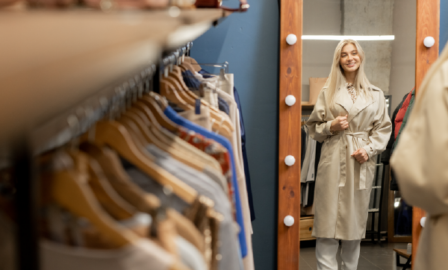The Impact of Blockchain and NFTs in Luxury Retail
How are blockchain and NFTs impacting the luxury retail industry?
Understanding Blockchain and NFTs
To understand non-fungible tokens (NFTs), it’s important to start with another equally complex concept–the blockchain. Essentially a public record system, the blockchain exists on thousands of user’s computers to verify transactions. For example, if one user sent another user a crypto coin in exchange for a digital painting, the transaction would be permanently logged and time-stamped for everyone to see. The world can now definitively see who owns the crypto coin and who owns the painting.
If one were to imagine that every transaction is like a building block and they’re all linked together, the term ‘blockchain’ comes to life. This proof of ownership concept is extremely important in an industry like luxury retail, which faces threats from counterfeit products, forged records of ownership, and other fraudulent activities.
An NFT is essentially a unique piece of digital content. For example, a gif of an animated cat, a photo of pixelated people, or other examples are digital content creations that are then stored on the blockchain. In doing so, the world can verify 1) there is only one, and 2) who owns it. While taking a screenshot of those NFTs would garner the same exact image on a screen, it’s the public record of ownership that generates value.
Below we outline some important ways that blockchain and NFTs are impacting the luxury retail industry.
NFTs in Luxury Retail – Uncharted Territory
Many luxury retailers are interested in exploring innovative concepts with NFTs; however, there is a level of uncertainty and risk associated with the long-term ramifications of playing in this space. With NFTs consistently being purchased for tens of millions of USD in cryptocurrency, investors and economists speculate how much is artificial hype and how much is long-term perceived value.
Some of the fuel for the price hike may be due in part to psychological factors surrounding the value of spent crypto. Many don’t actually view crypto coins as money, but rather more akin to a chip in a casino. This means that consumers are more willing to shell out exorbitant prices because they don’t experience as much perceived loss.
Luxury retailers must be careful, especially as they begin to accept crypto for physical products, because there is only a short history of data to demonstrate what customers are willing to pay. Such a volatile pricing structure could leave retailers out to dry if consumer psychology abruptly views crypto as equivalent to money.
Supporting Premium Prices
NFTs themselves are clearly becoming luxury commodities, but another interesting development is their pairing with physical products. Some of the most important aspects of luxury products are their authenticity and uniqueness. A few luxury retailers have realized this and thus paired physical products with NFTs to provide digital verification.
An accompanying NFT to a physical item might also help retain or even increase value in the luxury resale market. Just like a fully-fledged NFT, the physical product would gain verifiable and unique status in the market, solidifying the qualities that customers value most in luxury goods.
These reasons have led to a lot of excitement for NFTs in the luxury market. Here are some notable recent examples of NFTs accompanying physical luxury products:
- Jacob & Co.: The launch of the Astronomia Metaverso collection by Jacob & Co. includes five one-of-a-kind planetary watches each paired with an NFT of their respective image. There are also three purely NFT watches for the remaining three planets (Saturn, Uranus, and Neptune). A comic and cinematic movie provides potential purchasers with a fantastical backstory explaining how scientists accidentally opened a wormhole that sucked the physical watches into the metaverse. While it’s a cool talking point, the comic and video are more important for creating an experiential purchase that luxury retailers struggle to provide for metaverse products. Additionally, the future owners of the watches will have access to a range of exclusive Jacob & Co. events and activities, further adding to the experience. The watches have not yet been released.
- Dolce & Gabbana: The luxury and fashion retailer Dolce & Gabbana made headlines when they sold a nine-piece collection of NFTs for roughly $5.7 million USD in cryptocurrency. The sale also included five physical dresses and suits that were paired with identical NFTs. The remaining four were purely digital based on D&G sketches.
Both Jacob & Co. and Dolce & Gabbana partnered with online marketplace UNXD.com and have proven the added value that NFTs bring when paired with physical products. This insight is important for smaller luxury brands or boutiques in deciding whether to pair their physical products with a digital presence on the blockchain.
Looking Forward for Luxury Retail and NFTs
There are certain foundations upon which the luxury retail market has been based, like long-term value, product storytelling, and experiential shopping to name a few. Luxury retailers, however, should be careful when dealing with any rapidly emerging technologies that have not existed long enough for guidelines to exist. Brands could potentially abuse such a new market rather than sticking to the pillars that define luxury products. Some worry that by simply appealing to mass-market hype for NFTs, the luxury retail industry is diminishing ideals (like long-term value) in the name of volatile prices.
Regardless, the ability for luxury retailers to pair physical products with certified stamps of authenticity through NFTs can have positive financial impacts for primary and second-hand consumers. Ultimately, these brands and many more including Prada, Ray-Ban, Louis Vuitton, Givenchy, Burberry, and Bulgari are redefining what it means to own a luxury product that lives and dies by its relative rarity, proven value, and verifiable authenticity.
Subscribe to Clarkston's Insights
Contributions from Jake Park-Walters



